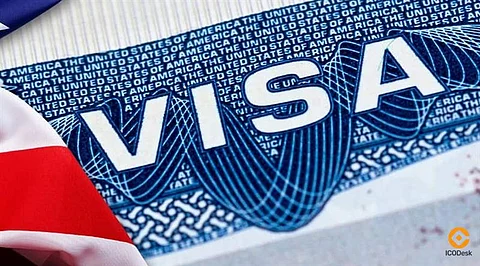

The new one-year pilot program will require certain B-1 and B-2 applicants (business and tourist visitors) to deposit refundable bonds of $5,000, $10,000, or $15,000 before receiving visas for nationals of countries with high overstay rates or weak vetting systems.
The program will begin on August 20, 2025, and will continue until August 2026. It is expected to be published in the Federal Register on August 5, with the list of countries to be announced no less than 15 days prior to the program launch.
Consular officers will use the risk level associated with each visa application to determine bond amounts.
The bonds originate from Executive Order 14159, signed by President Trump on January 20, 2025, which mandated stronger visa enforcement measures to reduce overstays and enhance screening.
DHS has estimated over 500,000 suspected B-1/B-2 visa overstays for fiscal 2023, excluding travelers from Canada, Mexico, and Visa Waiver Program countries. Critics argue that bonds could make it difficult for middle-class travelers to afford trips or hinder visits altogether.
However, the US Travel Association estimates that only about 2,000 applicants-mostly from countries with low travel volumes - will initially be impacted.
Bond amounts: Instead of the previously set enforcement amount of $5,000, consular officers will generally issue bonds of $10,000 per adult and $5,000 per minor, with the possibility of raising the bond to $15,000 when necessary.
Refunds: Bonds can be refunded if the visitor leaves within the designated time at the specified ports of entry, becomes naturalized in the US, or dies; otherwise, the bond is forfeited.
Exemptions: Nationals of Visa Waiver Program countries - primarily European and allied nations like Japan and Australia - are exempt this time. Consular officers may also waive bonds if they would cause undue hardship.
But, again, the program only revives a pilot similar to the one attempted months before the end of 2020, although it never took effect due to the outbreak of COVID-19. It is part of an ongoing crackdown on immigration by the Trump administration, including the travel ban on twelve nations.
As of June 2025, there will be stricter student and vetting requirements under Executive Order 14161. Usually, most temporary visa applicants will also be charged a $250 "visa integrity fee," which definitely adds to their financial burden. Immigration attorneys argued that travelers will face hefty costs as USCIS fees are expected to increase soon.
In addition to the standard $185 application fee, applicants for certain visas might also be required to pay up to $15,000 in bond money and an extra $250 under a new 'integrity’ fee; a significant increase.
Critics worry the new rule will prevent travelers from India, Brazil, Haiti, Russia, and other countries from entering unless they are explicitly exempted from doing business or tourism there. Supporters argue the bond system will discourage overstays and motivate foreign governments to improve their vetting standards, using the bond as diplomatic leverage.
This change represents a major shift in US visa policy, especially for nationals from ‘high-risk’ countries. It highlights the administration’s commitment to stricter immigration enforcement and trying out new tools for compliance.